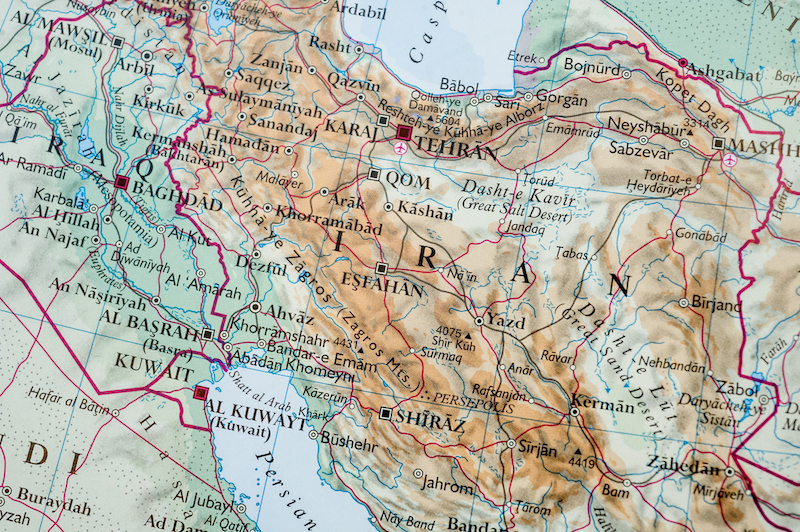There’s no doubt these are politically tense days in the United States. Between the various policies put forth to address immigration, ISIS, foreign policy, health care, and the economy, it seems everyone on both sides of the aisle can find good reasons to be unnerved.
My work with the church in Iran has taught me that politics and policies can certainly have significant ramifications for the church. The rise of the Islamic regime led to a ban on Persian Bibles, the ousting of Christian missionaries, and evangelism becoming illegal. Many above-ground churches were shut down and several pastors killed for their unwillingness to submit to the government’s prohibition on Christian ministry.
The suffering of believers in Iran continues to this day. Many of my Iranian coworkers have spent time in prison for their faith. Some have lost homes, jobs, and economic security. Others have been forced to leave their homeland to live as refugees. I’ve seen how government persecution can pull apart families and leave lasting emotional scars.

Governments can make living out our faith costly and dangerous. But my Iranian brothers and sisters have impressed on me a deeper truth: Though politics are important, they cannot thwart God’s purposes.
Politics Can’t Stop God
Psalm 2 paints a beautiful portrait of God’s sovereignty over the nations, and the Iranian church provides a powerful modern-day testimony to this truth. Suffering is often horrible, yet we’ve seen how God can use seasons of hardship to strengthen and multiply his church.
When the Islamic regime came into power during the political revolution of 1979, many hoped for a better life. Instead the revolution ushered in an era of religious oppression, economic decline, war, and political subjugation. In time, hope turned to disillusionment. Many Iranians began to question Islam. The current violence in the name of Islam has further complicated feelings for many in Iran. Iranians are Persian—not Arab—and their memory extends to the Persian empire and a time before Islam. So as many Iranians grow discouraged and distrustful of the Islamic regime, they’re actively searching for the truth. And many are finding in Jesus the truth they’re after.
In 1979, there were only around 500 Christians from a Muslim background. Today there are hundreds of thousands, and the number grows each day. Iranian church leaders acknowledge that political oppression is a key factor in the current openness of the Iranian people. While these leaders don’t glorify in persecution, they believe God is using it to grow his church. In fact, as one leader remarked to me, “Every time an Islamic official in Iran says something offensive about Christians, more people seek out someone to tell them about Jesus.”
Certainty in Tough Times
I’m not writing to glorify the current political unrest we’re facing in America. It’s truly heartbreaking to see my country so divided, and to imagine potential adverse scenarios for the church. My desire is to give glory to Jesus who sits at the right hand of the Father—and who is able to build his church in all circumstances (Matt. 16:18).
Scripture says Christians shouldn’t be caught off-guard by difficult times, as if something strange were happening (1 Pet. 4:12). It also reminds us we shouldn’t live in fear, since we know Jesus’s love (1 John 4:18). There is no need for us to shrink back or lose hope because of the current political climate.
Yes, these are tumultuous times, and we have no guarantee American politics will improve. But we can be certain that “for those who love God all things work together for good, for those who are called according to his purpose” (Rom. 8:28). We know that “if God is for us, who can be against us?” (Rom. 8:31). We’re promised that neither tribulation, distress, persecution, danger, nor the sword shall separate us from God’s love in Christ (Rom. 8:35). Far from living defeated, we are more than conquerors through him who loved us (Rom. 8:37).
These are the promises of Scripture, and the story of Iran’s church testifies to these promises in our lifetime.
Risen King, Reason to Hope
Though politics is important, Jesus promised to build his church regardless of who’s in worldly power. Church growth doesn’t depend on the next president of the United States. Our goal as believers, then, isn’t primarily to be successful politically, but to remain faithful to our calling.
Jesus is Lord. He got up from the dead. His victory is secure. And his purposes to magnify himself won’t be thwarted by the Islamic regime or the new president of the United States—whover wins.
Finally, we haven’t been left powerless before worldly rulers. Paul tells us to pray for political leaders (1 Tim. 2:2), and Jesus expects us to pray even for persecutors (Matt. 5:44). We pray knowing that the One who hears and cares is King of kings and Lord of lords.
Previously:
- The Story of Iran’s Church in Two Sentences (Mark Howard)
- 5 Ways Persecution in Iran Has Backfired (David Yeghnazar)
Editors’ note: In light of the growth of the Iranian church, TGC has recently launched a Farsi-language micro site, including translations of sermons and books by Mark Dever, Kevin DeYoung, John Piper, David Platt, R. C. Sproul and others. Help spread these resources to Farsi-speaking believers you know!
Is there enough evidence for us to believe the Gospels?
 In an age of faith deconstruction and skepticism about the Bible’s authority, it’s common to hear claims that the Gospels are unreliable propaganda. And if the Gospels are shown to be historically unreliable, the whole foundation of Christianity begins to crumble.
In an age of faith deconstruction and skepticism about the Bible’s authority, it’s common to hear claims that the Gospels are unreliable propaganda. And if the Gospels are shown to be historically unreliable, the whole foundation of Christianity begins to crumble.































